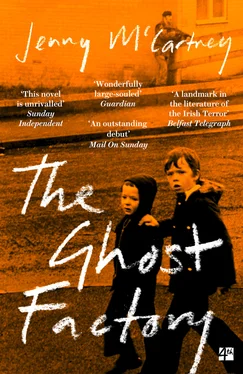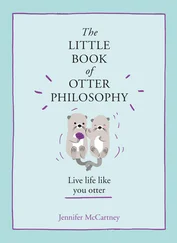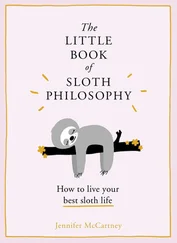A meaningful glance from behind the thick glasses. She would never say the actual word.
The door suddenly swung open and a stout, middle-aged man I had never seen before walked in. Mrs Hackett’s voice grew abruptly louder –
‘Well enjoy the ravioli, now. I hope you have an umbrella.’
‘Don’t worry, sure I’ve got my waterproof jacket.’
The thing I had liked about living with Big Jacky was his capacity for silence. It wasn’t a brooding silence, with argumentative storm clouds waiting to burst overhead. You could relax in the expanses of Big Jacky’s silence. It was the mental equivalent of an endless highway stretching out of sight, carrying within it peace and possibility.
These were the sounds that punctuated an evening with Big Jacky: the soft rustling of the newspaper, the hiss of the kettle, his belly-chortle at some fresh piece of idiocy issuing from the gabbling television, a courteous observation about the rain, the spit of sausages frying in a pan. He didn’t ask me too many questions. I suppose that’s why I told him almost everything.
I wondered sometimes how I, with my spiky edges and tangled imaginings, could have sprung from the quiet bulk of Big Jacky. He did, too. As a child, I would sometimes catch him looking at me strangely, as I gyrated wildly in my Indian chief’s headdress or danced with frustration over a difficult puzzle. I heard him once saying in a low voice: ‘You’re like her .’ I knew who he meant: my dark-haired snapshot mother, the fine-boned, smiling face that lay in his bedside drawer with his most precious things. She was frozen there, next to an earlier model of him grinning broadly beneath a modest dirty-blond pompadour. I don’t remember her. She died of meningitis when I was two.
In deference, perhaps, for me being like her , he fed me with books: shyly, at first. He brought home the daily newspapers and historical pamphlets from his newsagent’s shop. He bought dusty, dog-eared volumes from church fêtes and charity shops: everything from Oliver Twist to paperback Westerns by authors with names like Buck Tyrone and Cliff Ryder. He filled in little forms from the back of the Reader’s Digest in his sloping, careful hand, and sent off for handsome, maroon-bound tomes with titles like Strange Stories and Amazing Facts . They came thumping on to the doorstep, bursting with the lurid, illustrated mysteries of Spring-Heeled Jack, the fiery devil that terrorised the good citizens of Victorian London, and of the wailing faces which had appeared on floor tiles in Spain, mouthing inaudible agonies because the house had been built on the site of a medieval graveyard. There was even a photograph of the wailing faces: they were all smeary and open-mouthed, as though shocked at the cheek of the energetic Spanish housewives who had tried to wipe them off the tiles with a damp cloth.
He brought home the gleaming satin memoirs of Hollywood movie stars; and the autobiographies of long-dead sportsmen; and assorted poetry anthologies, trickling out lines of Larkin and Betjeman, Hughes and Heaney. Big Jacky didn’t say much, but every week floods of new words spilled from the pockets of his brown overcoat, and I danced around with expectation. The books piled up: Aunt Mary and Aunt Phyllis, my mother’s sisters, observed developments from a distance, darkly, twitching to take over. He must have sensed the conversations bristling self-righteously over their Carrickfergus kitchen table ( Something should really be done. There’s just him and the wee boy in there now, and the place is coming down with all these books he buys, and the child looks as peaky as bedamned ) and stubbornly ignored them.
If Spring-Heeled Jack and his clawing cohorts sprang into my dreams, and I woke up dry-mouthed with terror, I made my way to the room where Big Jacky slept. When he felt the nervous phut-phut of my breath on his sleeping cheek, he would stir and lift a corner of the quilt. ‘Get in,’ he said and I would lie awake, comforted, next to my big, flannel-wrapped bulwark against the dark.
Every so often the aunts would pay us a visit, motoring sedately into Belfast under the patchy pretext of a birthday (mine or his) or a spurious shopping trip (for one of those fine wool cardigans, a Christmas present for Anne next door, you know, can’t get them for love nor money in Carrickfergus, not even at McGill’s, just thought we’d call in and see how you two were getting on.)
Aunt Mary, her husband Sam, and Aunt Phyllis all lived together. Phyllis had never married. ‘Phyllis was too much of a lady to get married,’ said Aunt Mary, meaningfully. It was as though the goatish attentions of a man, all beard and raw lust, might have catapulted Phyllis on to a precipice of mental distress from which she would never claw her way back.
When Sam and Mary went on holiday, Phyllis came along with them. ‘Three’s company, four’s a crowd,’ Aunt Mary would carol gamely, although sometimes – when Phyllis was off peeling potatoes, drooping over the sink in her long brown cardigan – Mary would whisper: ‘Of course, sometimes Sam and I would like a wee fortnight on our own. But it wouldn’t really be fair on Phyllis, to leave her behind in charge of the house, away from all the fun.’
Mary’s whispers had a tendency to carry. Now and again I wondered if Phyllis could hear.
Sam enjoyed his bowls and his television. He was retired from his job as a bank clerk. We saw him about once a year, when we visited them in Carrickfergus, and then he would say: ‘Long time no see, Jackies Senior and Junior,’ and excavate himself from his armchair to fetch Big Jacky a whiskey.
He was a tame man, really. Any rebellious sinews in him had long ago been replaced with a convenient machine-washable stuffing. Mary had him kitted out in pale lambswool pullovers, like Rupert Bear. His clothing was organised to match the house, an overheated cave of squashy velveteen sofas, pastel Chinese rugs, and polished tabletops sprinkled with lace doilies. You could sink back into those soft furnishings and not be seen again for a week. It was a miracle Sam was still alive. One day scientists would discover him dead there, the suburban equivalent of the leathery men they found preserved for centuries in those Danish peat bogs. He would have his eyes still wide open and his hand stiffened around the remote control. They’d dub him the Bungalow Man, and scientists would marvel at the contents of his stomach (a diet of oven chips and chicken nuggets, specifically designed by Mary to generate no kitchen mess).
China figurines of dancers sprang from the sideboards, suspended in eternal pirouettes. Brass lamps gleamed from shining coffee tables. The furnishings of the house demanded a vigorous cleaning regime. They got it with blasts of spray and polish, worked in deep with triple applications of elbow grease.
Our front room in Belfast clamoured for no such attention. It had a brown 1950s sofa with wooden legs, and a fraying green armchair. A low, rectangular coffee table provided a stationing point for mugs of tea. Big Jacky accommodated himself in the armchair while I extended myself on the sofa, where years of pressure had made convenient buttock-shaped dents. When the aunts came to our house, I could see that the sparseness of Big Jacky’s taste dismayed and unsettled them. They fluttered around, hunting for a corner on which to perch. They besieged my father with pointless knick-knacks: fringed, furiously patterned cushions, knowing china squirrels with nut-packed cheeks, Belleek pottery sweet-dishes and embroidered tablecloths, to take the edge (although they never actually said this) off his spartan, miserable life with his peaky, odd son. He thanked them politely and pressed them to take some more tea. When they had gone, he put the things away carefully in a cupboard, and brought a small selection back out only before their next visit.
Читать дальше












